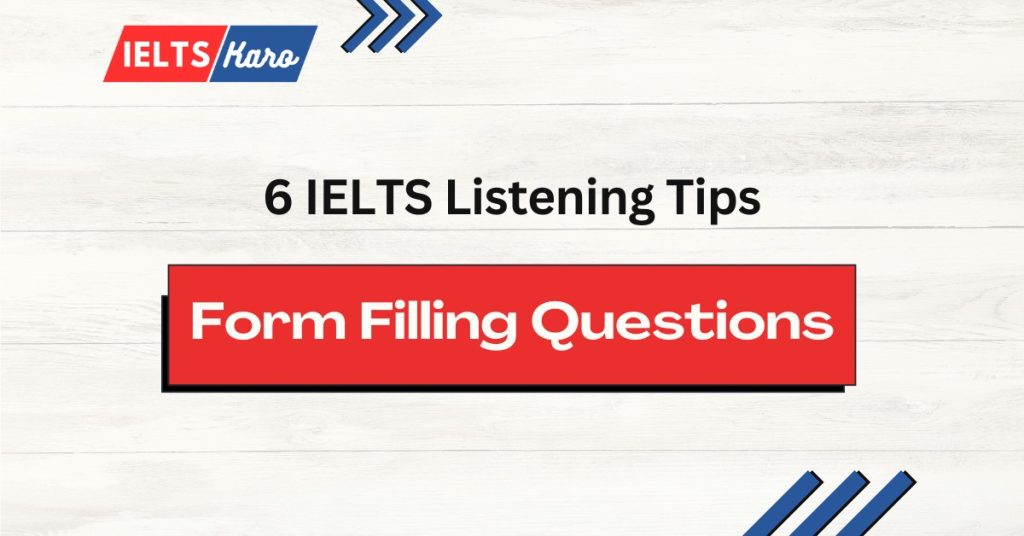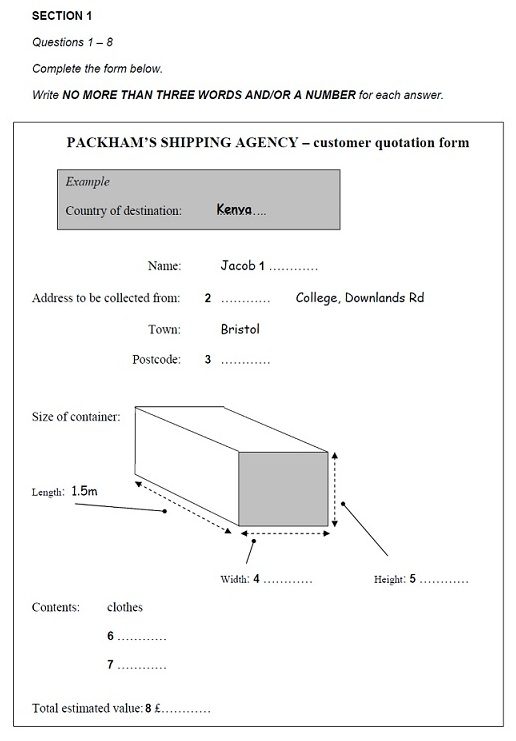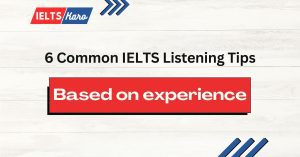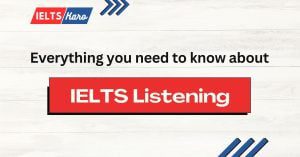IELTS Listening Form Filling Questions
The IELTS Listening Form Filling Question is usually the first section in the IELTS Listening Test, for Part 1. It is also the easiest one and provides a quick way to gain marks just by paying attention. This is similar to what you’d do typically by calling a logistics company, or any other service provider asking for their rates, and sharing your name/telephone number.
Now let’s put this to the IELTS Listening Test. And all you need to do? Listen, pay attention, and jot down the details.
The answers could be “One Word” or “No More Than Two Words”, and you have to write telephone numbers, etc.
While as simple as it may sound, many students often lose marks in this part.
This is also where IELTS lays down traps for you, as discussed in our blog post on IELTS Listening Traps and Tips. You will hear one part of the answer, thinking it is correct, and the speaker will immediately proceed with another answer. Hence, you have to jot down everything on the separate piece of paper that you will get on the test day.
Here are some ways that you can prepare for this:
Predict what may about to come next
Prediction, although not always correct, still helps you to guess the correct answer. For example, if the question you hear is:
What time would you like to make the reservation at?
The answer should be in the form of a time, followed by AM or PM.
If the speaker asks for the name of the person, then the answer is mostly the first, last, or full name of the other speaker in the recording.
For example:
Name: John Roberts
Room no. ___________
Number of occupants: 1
Check out time: ____________
This is pretty much self-explanatory. The Room No. and the Check Out Time allows you to predict that there will be a number, and a time as the answers to these questions.
Focus on the grammar aspect, such as noun, verb, adjective, and adverb. It becomes clear what form of the word you’d be using. For instance, let’s walk you through this simple form-filling question:
For question 6 and 7, we can predict based on clothes, that some of the content in a box could be books, computer accessories, a laptop, kids toys, etc. We can focus our attention to the type of contents in a box and easily write the correct answer.
As always, you get anywhere between 30 to 45 seconds before you listen to the recording. Use this time wisely to visualize the answers.
Focus on Synonyms and Related Words
IELTS Listening and Reading questions focus on synonyms. For example, it can be common for you to hear “tall” and see “height” in the question. Related words and synonyms are important as they play a crucial role in improving your understanding and getting a good band score.
It is also vital to note that you may not hear all of the words that you see on the question paper. This is a deliberate trap by IELTS, so that you focus your mind on synonyms and related words.
Word Limit
NO MORE THAN TWO WORDS and WRITE ONE WORD ONLY should not be difficult to understand. If your answer exceeds more than required, it will definitely be marked as incorrect.
Please pay close attention to these terminologies.
Letters Are Spelled Out – Mostly!
Most of the times, whenever there is a difficult word, the recording will spell it out for you. Use that spelling for each letter to your advantage by writing the letter as you hear them. This is a great way to ensure that you are able to answer this question correctly.
Postcode Addresses
In the example above, you will see the option for a postcode. This is the typical part of an address of residents in the US, UK, Australia, Canada and New Zealand. Do not panic if you hear the postcode, because just like names, it will always be spelled out for you!
Days and Dates – Spelling is important!
Spelling for days is important. As mentioned earlier, wrong spelling for a correct answer will lead to an incorrect answer.




